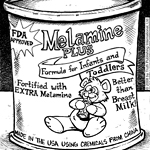List of Amino Acids Needed by Your Body
| Share on Facebook | Share on Twitter | Share on Google+ |

This article provides an a list of amino acids and offers you with more comprehensive information on how these chemicals help your body function well.
Importance of Amino Acids to Human Health
The importance of amino acids is directly related to the indispensability of proteins in our body. Proteins are what make up your muscles, ligaments, organs, tendons, tissues, glands, nails, hair - almost every part of your body is made up of proteins. In the same way, repair, maintenance of cells and critical bio-chemicals processes in the body are dependent on proteins.
Amino Acids List
Here is the list of 20 amino acids that your body can not live without:
| Amino Acid | Essential | Non-Essential |
|---|---|---|
| Alanine | * | |
| Asparagine | * | |
| Aspartic acid | * | |
| Arginine | * | |
| Cysteine | * | |
| Glutamine | * | |
| Glycine | * | |
| Glutamic acid | * | |
| Histidine | * | |
| Isoleucine | * | |
| Lysine | * | |
| Leucine | * | |
| Phenylalanine | * | |
| Methionine | * | |
| Serine | * | |
| Proline | * | |
| Tryptophan | * | |
| Threonine | * | |
| Tyrosine | * | |
| Valine | * |
What are the Two Types of Amino Acids?
Amino acids are classified into two general types: essential and non-essential amino acids. Essential amino acids are those that can not be synthesized by the body on its own and thus need to be acquired through your diet. Non-essential amino acids are those that your body can produce, specifically by the liver, without any outside help.
A List of Essential Amino Acids (Indispensable Amino Acids)

Here is a list of essential amino acids found in your body:
- Isoleucine
- Histidine
- Leucine
- Methionine
- Lysine
- Phenylalanine
- Tryptophan
- Threonine
- Valine
Non-Essential Amino Acids

Your body can produce the other half of the twenty amino acids out of other chemicals that are present in your body. Refer to the non-essential amino acids list below:
- Alanine (from pyruvic acid)
- Arginine (from glutamic acid)
- Asparagine (from aspartic acid)
- Aspartic Acid (from oxaloacetic acid)
- Cysteine
- Glutamic Acid (from oxoglutaric acid)
- Glutamine (from glutamic acid)
- Glycine (from serine and threonine)
- Proline (from glutamic acid)
- Serine (from glucose)
- Tyrosine (from phenylalanine)
Amino Acid Sources (Essential)
If you fail to obtain even just one out of the ten essential amino acids, your body's proteins so that obtaining all of them in your daily diet is a must. Also, unlike fats and carbohydrates, your body does not tend to store excess supplies of amino acids for later use - you should get a regular supply of them everyday.
Foods with amino acids include animal and vegetable sources. Most of the animal sources such as meat, eggs and milk are considered to be "complete protein sources" meaning that these contain all the essential amino acids that your body needs. Vegetables are also good amino acid food sources (especially soy, nuts and beans) but most of them do not usually contain all of the ten. For instance, rice is not a good source of lysine and isoleucine.
Amino Acid Deficiency and Supplementation
These days, deficiencies of the amino acids happen more often than you think. Many people, especially those who try weight loss programs and vegetarians, consume insufficient amounts of protein. Thus, supplementation of amino acids has been increasingly necessary.
Complete Nutrient System - All Amino Acids and Nutrients in a Formula

Amino supplements are very important as they counter the deficiencies (if you have them) and offer therapeutic benefits to your body. For your amino acid supplementation needs, we highly recommend Xtend Life's Total Balance. It contains all the essential and non-essential amino acids that your body requires (in safe proportions), along with amino acid SAMe (rarely used in supplements because of its cost), vitamins, minerals, enzymes, and herbal extracts that assures you of a healthy and disease-protected body. You can read our review of it here
F.A.Q
Why are Amino Acids Important?
Amino acids provides the cells the building material to maintain their basic structure, helps them to produce the energy body needs and are essential for every metabolic functioning.
How many amino acids are there?
There are a total of 20 amino acids found in our body.
How many essential amino acids are there?
There are 9 amino acids that are essential for your diet. We should note that arginine is also an essential amino acids during growth periods.
Is Arginine an Essential Amino Acid?
Arginine is known as a semi-essential or conditinally essential amino acid. If you are at a development stage or growth period, it is considered as an essential amino acid. For example, arginine is essential for infants and growing children.
Is Histidine an Essential Amino Acid in Humans?
Histidine was considered as an essenitial amino acids for infants only but further studies have shown that it is essential for both adults and infants.
What are Semi Essential Amino Acids?
Amino acids that is required in certain conditions is known as semi essential amino acids. Arginine and histidine are two amino acids that are grouped as semi essential amino acid. (New studies indicate that histidine is essential for adults)
Can your body manufacture the nine essential amino acids?
In short, your body can not make essential amino acids. You have to get these amino acids from food sources.
-
Skin CareMen Skin Care
-
Free ResourcesFree eBooks
-
By creating an artificial environment, we're not stimulating our immune system enough. Germs are immune-stimulants. They challenge you to be prepared.Deepak Chopra
-
Featured Health Supplement
 ...a broad spectrum of around 80 of the nutrients that your body needs…including vitamins, minerals, trace elements, antioxidants,
amino acids, neuronutrients, bioflavonoids, carotenoids, herbal extracts, enzymes and other complementary co-factor ingredients.
...a broad spectrum of around 80 of the nutrients that your body needs…including vitamins, minerals, trace elements, antioxidants,
amino acids, neuronutrients, bioflavonoids, carotenoids, herbal extracts, enzymes and other complementary co-factor ingredients.
-



















